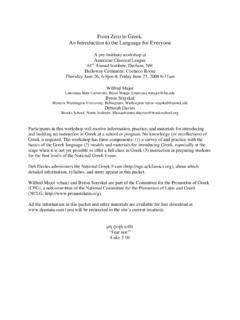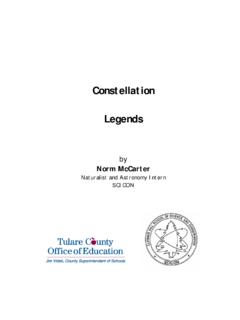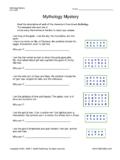Transcription of From Zero to the National Greek Exam: An …
1 From Zero to the National Greek Exam: an introduction for Everyone a workshop at the American Classical League 64th Annual Institute, Minneapolis, MN Saturday June 25, 2011 2:00-3:30 Wilfred E. Major Louisiana State University Chair of the Committee for the Promotion of Greek ( ) & Deb Davies Brooks School (North Andover, Mass) Chair of the National Greek Exam ( ) This workshop provides materials and instruction for teachers who wish to begin introducing ancient Greek to their students. The presentation neither requires nor expects any prior knowledge of Greek . The " introduction to Greek " level of the National Greek Exam has a syllabus designed to be accessible for study only a day or two a week or outside regular class time.
2 The workshop provides the information necessary for participants to prepare their students to compete on this exam. The presentation has three components: 1. a survey of, and frequently-asked-questions about, the Greek language 2. a survey of the cultural information on the introduction to Greek syllabus 3. practice with the grammar and syntax on the introduction to Greek syllabus. All the information in this packet and other materials are available for free download at (you will be redirected to the site s current location). Fear not! Luke 2 This Packet Contains National Greek Exam: information and Syllabus: introduction to Greek Exam (pp. 3-5) Frequently Asked Questions about Ancient Greek (pp.)
3 6-11) o Historical Overview of Greece o Types of Greek from Linear B to Modern Greek o Typing and Printing Greek o Textbooks and Resources for Beginning Greek A survey of the cultural information on the syllabus for the " introduction to Greek " level of the National Greek Exam (sections II and III) (p. 12) o Greek Geography o Historical Events and People A survey of the language information on the syllabus for the " introduction to Greek " level of the National Greek Exam (sections I and V) (pp. 13-36) o The Alphabet o Overview of Greek Grammar o Understanding Greek text Verbs Nouns Prepositions o Derivatives for the " introduction to Greek " level of the National Greek Exam (section IV) (p.
4 37) Vocabulary lists (pp. 38-45) 3 National Greek Exam: Syllabus: introduction to Greek Exam I. Alphabet Know Attic Greek alphabet, in correct order, upper and lower case; rough breathing Know names of all letters Be able to transliterate Greek letters into English equivalents, and vice versa Be able to transform lower case to upper case, and vice versa Be able to give preceding and following letters of the alphabet II. Geography Know location of: Athens, Sparta, Thebes, Troy, Delphi, Olympia, Corinth, Mycenae, Alexandria, Crete, Sicily, Rhodes, Euboea, Aegean Sea, Ionian Sea, Black Sea, Adriatic Sea, Nile, Hellespont. III. Historical Events and People Know relative dates and historical importance of: Pericles; Darius; Xerxes; Philip of Macedon, Alexander the Great Socrates, Plato; Aeschylus, Sophocles, Euripides; Herodotus, Thucydides Thermopylae, Marathon, Artemisium Persian Wars; Athenian Empire; Peloponnesian War Know three Architectural Orders Ionic, Doric, Corinthian IV.
5 Derivatives Know derivatives of the following prepositions and prefixes: , , , , -, , , , -, , - , , , , , , V. Understanding Greek text Know noun/adjective endings 1st and 2nd declension all cases singular and plural Know verb endings present Indicative active 1st, 2nd, 3rd person singular and plural Should be able to understand easy sentences, including prepositional phrases and adjectives 4 ACL/NJCL National Greek Exam RESULTS OF THE 2011 ACL/NJCL National Greek EXAMINATION The National Greek Examination in 2011 enrolled 1769 students from 154 schools. Typically over 50% earn purple, blue, red, or green ribbons.
6 The battery of six examinations consisted of five Attic Greek exams ( introduction 412, Beginning 741, Intermediate 360, Prose 88, Tragedy 28) and a Homeric Greek exam (Odyssey 140). THE 2012 ACL/NJCL National Greek EXAMINATION The next National Greek Examination will be administered Monday-Saturday, 5-10 March 2012. Entrants will pay $ for each examination (Foreign - $ per exam) chosen from the battery. An entrant may not cross levels in Attic Greek (take both Beginning and Intermediate Attic) but s/he may take an Attic and a non-Attic examination (Intermediate Attic and Odyssey), so long as s/he pays $ for each examination taken. In addition, only the Attic Prose exam may be taken for two years in a row.
7 Applications will be accepted only from teachers; others should call Dr. Deb Davies before ordering and explain any special circumstances. Applications must be postmarked no later than Tuesday, 17 January 2012. The entry application from the teacher should include total payment. If there is no alternative and the NGE office must bill a school system, a handling fee of $ will be added to the bill. Copies of the 2012 National Greek Examination will be mailed by the beginning of March to the designated examiner, but NOT to the teacher who mailed the application. If the examinations are not received by the 1st of March 2012, please contact The American Classical League (see below). Schools which, for reasons of vacation or other schedule conflicts, wish to administer the examinations during the week of 20 February 2012, should so note on the application so that the NGE office will know when to expect the answer sheets back.
8 All answer sheets must be postmarked no later than Monday, 12 March 2012. OPPORTUNITY FOR SCHOLARSHIP In 2012, high-school seniors who earn purple or blue ribbons in upper level exams will be eligible to apply for one scholarship in the amount of $1,000. The scholarship will be paid to the winner s college or university on condition that s/he earn six credits of Greek during the school year. The winner will be selected by the NLE/NGE Scholarship Committee, chaired by Ephy Howard, Troy, AL. Teachers of eligible students will receive application forms in the mail by early May, 2012. Winners will be announced at the ACL Institute in June 2012, and notified directly thereafter by mail. Dates and amounts preliminary and subject to change.
9 5 5-10 MARCH 2012 High-school and college/university students enrolled in 1st year (elementary), 2nd year (intermediate), or 3rd year (advanced) Attic or Homeric Greek are invited to enter the 28th ACL/NJCL National Greek Examination. The usual sequence of exams is introduction to Greek (intended for high school students learning in a non-traditional environment), Beginning Attic (for high schools only), Intermediate Attic, Attic Prose (which may be repeated for 2 years) and Attic Tragedy. Homeric Greek can be taken in any year. Students should take the exam that most closely matches their experience. All difficult vocabulary or syntax will be given as applicable to each level.
10 Summaries of each passage will be provided. It is suggested that you review the syllabi before ordering any exam. Each examination will last 50 minutes. Each examination will contain 40 questions, with multiple-choice answers. For each of the forty questions on an examination, there will be as many as four answers, one of them correct, the others distracters. All passages printed in the above examinations should be treated as sight passages. Accordingly, students entering the NGE would best prepare themselves by reading sight passages from the authors mentioned in the syllabi, and reading them for both comprehension and grammatical analysis. Syllabi Available You may request syllabi from The American Classical League (address below).







